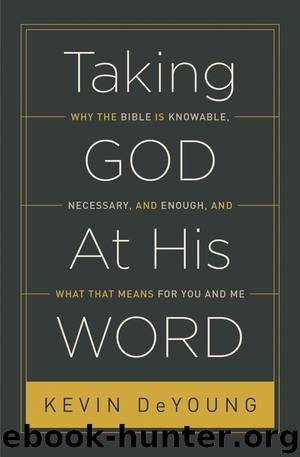Taking God at His Word by Kevin DeYoung

Author:Kevin DeYoung
Language: eng
Format: epub
Publisher: Crossway
These two episodes—one in Thessalonica and one in Berea—have a lot in common. In both cities, Paul began his evangelistic work in the synagogue (vv. 1, 10). On both occasions we see the word proclaimed and examined and the use of reason and persuasion (vv. 2, 3, 4, 11, 13). And in both instances the general response was similar: controversy ensued because some received the word (vv. 4, 12) while some hated it (vv. 5, 13). The mission ventures in Thessalonica and Berea were similar to each other in several ways and much like Paul’s experience preaching the gospel in other Greco-Roman cities.
But not similar in every way. The comparisons above are misleading in one respect. While the gospel proclamation was controversial in both cities, the crowds were agitated in Berea because Jews from Thessalonica had come to stir them up. Even though the basic outline of events is the same, we are clearly meant to see a contrast between the Thessalonian and the Berean approaches to the word of God.
Theatrical Thessalonians
The Thessalonian attitude toward the truth of the gospel is destructive, bordering on delirious. For starters, their judgment is clouded by personal prejudice. The Jews don’t like that Paul is popular (Acts 17:5). In fact, it’s a good bet most of the converts in Thessalonica were from paganism, not from Judaism (1 Thess. 1:9). Paul’s own people disregarded his message because they thought he was too much of a big shot. Unfortunately, this sort of prejudice happens all the time. People will dismiss the word of God because the music in church is too loud or too old, or the church is too small or too big, or because the pastor dresses funny, or because they knew a mean Christian once, or because they don’t want to be like their parents.
And sometimes we find a reason to reject the word of God because we aren’t interested in doing what it says. As Aldous Huxley, the famous author of Brave New World who dabbled in eastern mysticism and LSD, once remarked,
For myself, as, no doubt, for most of my contemporaries, the philosophy of meaninglessness was essentially an instrument of liberation. The liberation we desired was simultaneously liberation from a certain political and economic system and liberation from a certain system of morality. We objected to the morality because it interfered with our sexual freedom; we objected to the political and economic system because it was unjust.1
Download
This site does not store any files on its server. We only index and link to content provided by other sites. Please contact the content providers to delete copyright contents if any and email us, we'll remove relevant links or contents immediately.
The Five People You Meet in Heaven by Mitch Albom(3548)
The Secret Power of Speaking God's Word by Joyce Meyer(3152)
Real Sex by Lauren F. Winner(3001)
Name Book, The: Over 10,000 Names--Their Meanings, Origins, and Spiritual Significance by Astoria Dorothy(2967)
The Holy Spirit by Billy Graham(2938)
0041152001443424520 .pdf by Unknown(2841)
How The Mind Works by Steven Pinker(2809)
ESV Study Bible by Crossway(2770)
Ancient Worlds by Michael Scott(2665)
Churchill by Paul Johnson(2574)
The Meaning of the Library by unknow(2558)
The ESV Study Bible by Crossway Bibles(2543)
The Gnostic Gospels by Pagels Elaine(2515)
MOSES THE EGYPTIAN by Jan Assmann(2410)
Jesus by Paul Johnson(2348)
City of Stairs by Robert Jackson Bennett(2337)
The Complete Dead Sea Scrolls in English (7th Edition) (Penguin Classics) by Geza Vermes(2269)
The Nativity by Geza Vermes(2221)
Ancient Near Eastern Thought and the Old Testament by John H. Walton(2217)
